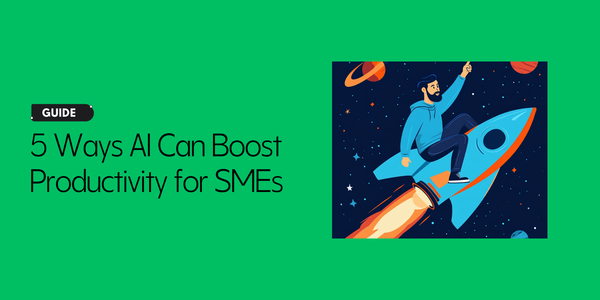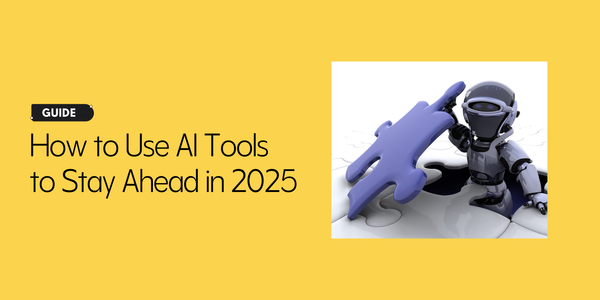Imagine cutting your workload in half while doubling your customer satisfaction—sounds like a dream, right? For small businesses, artificial intelligence (AI) is making this a reality. No longer reserved for tech giants with massive budgets, AI is now an accessible, practical tool that's transforming how small businesses operate. Whether you're a local retailer, a service provider, or an online entrepreneur, AI can help you save time, delight customers, and compete with the big players.

AI tools are now accessible to businesses of all sizes, not just tech giants
The Small Business Struggle: Why You Need a Game-Changer
Running a small business is a balancing act. You're managing tight budgets, limited staff, and a constant stream of tasks—marketing, customer service, inventory, and more. The pressure to grow while keeping costs low can feel relentless. Here are some challenges you might recognize:
- Time Constraints: Hours spent on repetitive tasks leave little room for strategy or innovation.
- Resource Limitations: Hiring more staff or investing in new systems often isn't an option.
- Customer Expectations: Today's customers demand fast, personalized service—24/7.
- Competition: Larger companies with deeper pockets seem to have an unfair edge.
These pain points can make you feel stretched thin, stuck in survival mode rather than thriving. But what if there was a way to work smarter, not harder? That's where AI comes in—a game-changer that's leveling the playing field for small businesses like yours.
AI: Your Accessible Ally
AI isn't some distant, futuristic concept—it's here now, and it's more affordable than ever. Think of it as a virtual assistant that never sleeps, helping you automate tasks, understand your customers, and make data-driven decisions. From free tools to low-cost platforms, AI is designed to fit small business needs without breaking the bank.
5 Game-Changing Ways AI Boosts Small Businesses
1. Automating Routine Tasks
What It Is: AI can take over repetitive chores like scheduling appointments, sending invoices, or managing inventory—tasks that eat up your day.
Why It Matters: Automation saves time and reduces errors, letting you focus on growth instead of grunt work. Studies show businesses that automate routine tasks can save up to 30% of their time—hours you could spend building relationships or planning your next move.
Real-World Example:
A small boutique uses an AI tool like QuickBooks to automate invoicing and payment reminders, cutting admin time by 10 hours a week. Meanwhile, an AI inventory system like TradeGecko tracks stock levels and reorders products automatically, preventing sellouts.
💡 Actionable Tip:
Start with one task. Try a tool like Calendly to automate appointment scheduling—it's free to start and integrates with your calendar.
2. Enhancing Customer Service
What It Is: AI-powered chatbots and virtual assistants handle customer inquiries 24/7, from answering FAQs to processing orders.
Why It Matters: Customers expect instant responses— 64% prefer businesses that offer round-the-clock support. AI delivers that without adding staff, while freeing your team for complex issues.
Real-World Example:
A family-owned bakery uses a chatbot (like Tidio) on its website to answer questions about hours, allergens, and custom orders. During peak holiday seasons, it handles 80% of inquiries, letting staff focus on baking.
💡 Actionable Tip:
Set up a simple chatbot with a platform like Chatfuel (no coding needed). Add a feedback feature so AI can learn from customer interactions and improve over time.

AI chatbots can handle customer inquiries 24/7, improving response times and customer satisfaction
3. Personalizing Marketing
What It Is: AI analyzes customer data—purchases, browsing habits, preferences—to craft tailored marketing campaigns.
Why It Matters: Personalized marketing boosts engagement by 74%, according to recent stats. It's like having a marketer who knows every customer personally, without the hefty salary.
Real-World Example:
An online pet store uses AI via Shopify's recommendation engine to suggest products (e.g., "Your dog loved this treat—try this toy next!"). This leads to a 25% uptick in repeat purchases.
💡 Actionable Tip:
Use Mailchimp's AI-driven insights to segment your email list (e.g., frequent buyers vs. one-time shoppers) and send targeted offers that hit the mark.
4. Optimizing Operations
What It Is: AI streamlines processes like supply chain management, financial forecasting, or workflow analysis by spotting inefficiencies.
Why It Matters: Small businesses often operate on razor-thin margins. AI cuts costs and boosts efficiency—think of it as a consultant that works for pennies.
Real-World Example:
A small landscaping company uses AI through a tool like Zoho Analytics to predict equipment maintenance needs, avoiding $5,000 in unexpected repairs last year. Another uses AI to optimize delivery routes, saving 15% on fuel costs.
💡 Actionable Tip:
Dip your toes in with Google Analytics (free) to track website performance, then explore AI add-ons to identify operational bottlenecks—like slow checkout processes.
5. Gaining Competitive Insights
What It Is: AI monitors market trends, competitor moves, and industry shifts, delivering actionable intelligence.
Why It Matters: In a fast-moving world, staying ahead is survival. AI gives you big-picture insights without a big research team.
Real-World Example:
A freelance graphic designer uses an AI tool like Crayon to track competitors' pricing and services, adjusting her offerings to win more clients. A small café uses AI to analyze local food trends, adding plant-based options that boost sales by 20%.
💡 Actionable Tip:
Set up Google Alerts for industry keywords (e.g., "small business trends") or try Mention to monitor social media chatter about your niche.
Overcoming AI Roadblocks
AI sounds great, but you might be thinking: "What about the cost? The complexity? The risks?" Let's tackle these head-on:
Cost Concerns
Challenge: "AI sounds expensive—I can't afford it."
Solution: Many AI tools offer free tiers or low-cost plans tailored for small businesses. Think Google Analytics (free), Trello's Butler automation (free with limits), or ChatGPT (free basic version). Start small, see the ROI, then scale up.
Complexity Fears
Challenge: "I'm not a tech expert—AI feels overwhelming."
Solution: Look for plug-and-play platforms with intuitive interfaces. Tools like Canva (AI design help) or Hootsuite (AI social media scheduling) require no coding—just a willingness to click around.
Data Security Worries
Challenge: "What if my customer data gets exposed?"
Solution: Stick to trusted providers with clear privacy policies (e.g., Shopify, HubSpot). Use strong passwords, enable two-factor authentication, and train your team on data basics.
By starting small and choosing user-friendly, secure tools, you can sidestep these hurdles and reap AI's rewards.
Why It's a Game-Changer: The Big Picture
Let's zoom out. AI isn't just about saving an hour here or boosting sales there—it's about transforming how you run your business:
Scalability
Do more with less, growing without the growing pains.
Competitiveness
Match—or beat—larger rivals with smart tech.
Resilience
Adapt quickly to market shifts, customer needs, or unexpected challenges.
For small businesses, AI is like adding a superpower to your toolkit. It's not about replacing people—it's about amplifying what you and your team can achieve.
Getting Started: Your AI Action Plan
Ready to make AI your game-changer? Here's a simple roadmap:
- Pick One Area: Choose a pain point—say, customer service or task overload.
- Try a Tool: Test a free or low-cost option (e.g., Calendly for scheduling, Tidio for chatbots).
- Measure Results: Track time saved, customer feedback, or sales bumps after a month.
- Expand Gradually: Add more AI as you get comfortable—maybe marketing next, then operations.
Small steps lead to big wins. You don't need to overhaul everything overnight—just start where it hurts most.
The Future Is Yours
AI is rewriting the rules for small businesses. It's not a luxury—it's a necessity for staying relevant, efficient, and customer-focused in a digital world. By automating the mundane, personalizing the meaningful, and unlocking insights you'd otherwise miss, AI empowers you to not just survive, but thrive. The future belongs to those who embrace innovation—don't let your small business get left behind.
Take the First Step
Try a tool today—Google Analytics for insights, a chatbot for support, or an automation app for tasks. Have questions? Success stories? Share them in the comments below—let's spark a conversation and grow together!







